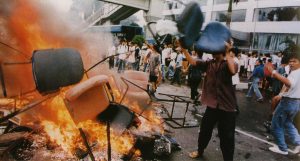The events of May 1998 form an indelible chapter in Indonesia’s history, marked by profound struggle and heart-wrenching grief, which continues to resonate in Indonesians’ hearts and collective memories. Although it saw the toppling of the Suharto regime after 32 years in power, this significant turning point came at a huge price. Even after 25 years, the wounds inflicted during the riots and bloodshed that attended Suharto’s fall remain unhealed.
According to the Joint Fact-Finding Team established by President J.B. Habibie in 2002, the riots claimed a huge number of victims: 1,200 people were burned to death, 8,500 buildings and vehicles were burnt to ashes, and more than 90 women of Chinese descent were raped and abused.
In the quarter-century since, the mothers of many of those killed in the riots of May 1998 have persevered, staging a protest every Thursday, outside the presidential palace in Jakarta. Known as “Kamisan,” this remarkable action has persisted now for nearly 800 Thursdays, with unwavering demands for justice for the victims of past human rights violations. Despite their efforts, there has been little accountability for the events of May 1998 – in large part because some of those responsible remain in positions of power.
Highly influential figures such as Defense Minister Prabowo Subianto and Wiranto, a senior adviser to President Joko “Jokowi” Widodo, who once held important positions of power in Indonesia, are often mentioned in discussions surrounding the events of 1998. Their prominence and political connections make pursuing justice difficult and have created a real barrier to accountability. At the time of riots, Wiranto and Prabowo were important military figures: The former was commander of the Indonesian National Armed Forces, while the latter headed the Army Strategic Reserves Command (Pangkostrad).
In addition, the pursuit of justice has been undermined by institutional and legal hurdles. As in many other countries, Indonesia’s legal system is complex. Gathering evidence, building a strong case, and bringing it to court can be time-consuming and difficult, especially when it involves high-ranking officials or historical events shrouded in layers of bureaucracy and political maneuvering.
In this context, the role of political will and public pressure cannot be underestimated. In many cases momentum for justice depends on the balance between the two. A lack of political will from elites can stall the process, so it is necessary for public pressure to be strong enough to compensate.
A further complicating factor is the issue of national stability. There is often a perception that seeking justice against high-ranking officials could lead to political unrest or even violence. This fear can be a barrier, slowing down or halting accountability. However, recognizing and learning from this chapter of Indonesia’s history is paramount. As the saying goes, “Those who cannot remember the past are condemned to repeat it,” a sentiment that has particular resonance in the Indonesian context.
The question of accountability was revived in January, when Jokowi gave a speech at the State Palace in which he formally acknowledged 12 past episodes of gross human rights violations, including the May 1998 riots. “I, as the Head of State of the Republic of Indonesia, admit that serious human rights violations have indeed occurred in various events,” Jokowi said, adding, “I deeply regret it.” Although many parties viewed his acknowledgment as a step forward, his remarks did not mention any form of judicial redress, which critics say will render them effectively meaningless.
To be sure, the process of addressing past human rights violations is undoubtedly very complex. It requires extensive legal and investigative work, political will, community support, and often systemic change. As a result, the journey to justice can be slow, leaving victims and their families waiting years, even decades. It underscores the need for citizens to advocate for justice and transparency, as public pressure can be instrumental in pushing governments to address past abuses.
In this regard, the upcoming election year provides an opportunity to bring the issue of the May 1998 riots back into the national conversation. Historical events and unresolved issues often surface at such times, and political candidates can use these topics to garner support or differentiate themselves from other candidates. In addition, discussing unresolved human rights violations could be a means for candidates to demonstrate their commitment to justice, the rule of law, and respect for human rights.
However, it is not enough for candidates to promise justice. They must present concrete and realistic plans for addressing past human rights violations. A candidate’s credibility on this issue is not just about their words but also their actions. Have they committed to human rights and justice in their past roles? Have they taken a stand on these issues, even when difficult or unpopular?
Aspiring leaders must demonstrate the political will and courage to confront this dark chapter in Indonesia’s history. It means standing up to those in power, pushing for investigations, and advocating for victims and their families, even in the face of resistance or backlash. In addition, a candidate’s ability to act independently of those involved in these abuses is also an important consideration. Having close ties to individuals or groups involved in the unrest may hinder their ability to pursue justice effectively.
As the 2024 elections approach, the mothers of the victims of the 1998 riots and their supporters remain steadfast in their quest for justice. Their resilience is a testament to their hope and belief in a more just and responsible Indonesia.
Ultimately, the fight for justice is not just about the past. It is about shaping a future where human rights are respected, accountability is demanded, and every citizen, regardless of political or social status, is treated with dignity and fairness. It is this Indonesia that the mothers of the 1998 riots envision – and with sustained commitment and action, it can be realized.

































